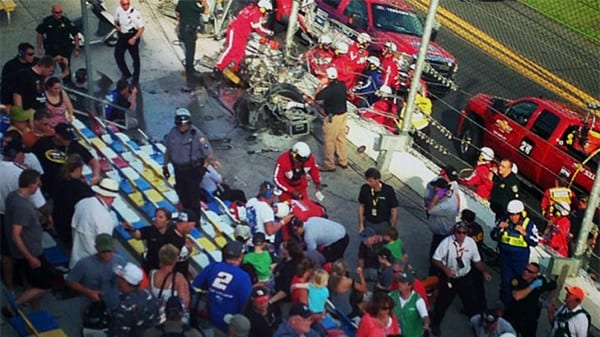
Legal proceedings have begun for fans injured in the horrible crash that happened during the Daytona 500. Even though there were more than adequate safety measures in place at the time of the incident, venue owners should consider the follow-up information a crowd safety how-to.
Since it was front page news nationwide nearly everyone is aware of the horrible accident involving fans at the Daytona 500 a few weeks ago. It is safe to assume such a terrible incident spurred every venue owner to review their crowd safety policies.
In a follow-up to the pervasive reporting made immediately after the accident, Kyle Hightower writes that legal proceedings have begun. Attorneys representing the race fans injured held a news conference to announce they are not going to file any lawsuits until after talks with the venue and NASCAR have concluded.
Hightower makes special note of the crowd safety burden that venues must bear even though waivers are printed on the back of the tickets:
Experts say there could be grounds for a lawsuit, and that courts have looked past liability waivers written on the backs of sporting event tickets. Others maintain the ticket is a legal contract that could be hard to overcome in court. Ultimately, I believe it would be gross negligence. We all know that when you go to a race you assume a certain amount of risk. But what people don't assume is that a race car will come flying into the stands.
Venue owners outside of Florida may not be aware of how often the state’s judiciary system looks past the legal agreements printed on paper tickets. The incident at the Daytona 500 may, in the eyes of a Florida jury, be classified as “extraordinary circumstances” that supersedes any claims made by the ticket purchase contract.
In defense of venues, Paul Huck, a professor at the University of Miami School of Law, said contract law could take precedence.
"A ticket to 1 of these events is like a contract - and its provisions limiting liability are generally enforceable," he said. "We enter into these types of contracts on a regular basis, and we often don't give it a second thought that we may be limiting or even giving up certain legal rights when we do so."
Venue owners that are diligent in their legal and moral obligations for crowd safety can use the Daytona 500 accident as a lesson learned, because the venue was, at the the time of the incident, in 100% full compliance with crowd safety laws. In fact, the fence surrounding the race track exceeded the legal requirements - but fans were still hurt.
Earlier, ThunderTix founder Dawn Green wrote her thoughts as a crowd safety how-to when she urged venues owners to:
"Review your fire safety, patron safety, and exit strategies with your staff to ensure your venue is prepared to handle potentially life threatening situations. If you’re not sure where to begin, consider downloading our guides for crowd management to help ensure the safety of your guests."
Just like freedom, the price of crowd safety is eternal vigilance. ThunderTix encourages to make routine audits of your facility and review your crowd safety policies on a regular basis.
Our role in the safe operation of our customers venues includes support for printed tickets, were the disclaimers and waivers are displayed, thermal printers, and our industry leading experience with gate control via barcoded ticket scanning.